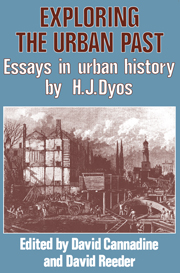Book contents
- Frontmatter
- Contents
- Acknowledgements
- Introduction: H. J. Dyos and the urban process, by David Reeder
- Part One The Urbanising World
- 1 The Victorian city in historical perspective
- 2 Urbanity and suburbanity
- 3 Greater and greater London: metropolis and provinces in the nineteenth and twentieth centuries
- 4 Some historical reflections on the quality of urban life
- Part Two Transport and Urban Transformation
- Part Three The Urban Fabric
- Conclusion Urban history in the United Kingdom: the ‘Dyos phenomenon’ and after, by David Cannadine
- Appendix: A bibliography of the published writings of H. J. Dyos
- Notes
3 - Greater and greater London: metropolis and provinces in the nineteenth and twentieth centuries
Published online by Cambridge University Press: 03 February 2010
- Frontmatter
- Contents
- Acknowledgements
- Introduction: H. J. Dyos and the urban process, by David Reeder
- Part One The Urbanising World
- 1 The Victorian city in historical perspective
- 2 Urbanity and suburbanity
- 3 Greater and greater London: metropolis and provinces in the nineteenth and twentieth centuries
- 4 Some historical reflections on the quality of urban life
- Part Two Transport and Urban Transformation
- Part Three The Urban Fabric
- Conclusion Urban history in the United Kingdom: the ‘Dyos phenomenon’ and after, by David Cannadine
- Appendix: A bibliography of the published writings of H. J. Dyos
- Notes
Summary
I think I should begin this essay on the Celtic fringes of Britain. I should then move rapidly on to London, which is a well-trodden route, and having planted my flag there survey the country behind me. My first Celtic reference must be to a man born in Edinburgh to Catholic Irish parents; who was raised and educated in that city, qualified as MD there in 1885, and then went to practice for a time in Southsea. Two years later he published his first novel, A Study in Scarlet, and a year later wrote for The Nineteenth Century a farcically statistical article ‘On the Geographical Distribution of the British Intellect’. What Dr A. Conan Doyle had done by way of research was to trace some 1,150 men of DNB standing who belonged to what he described as ‘the intellectual walks of life’, and out of the 824 ‘English roll of honour’ he located 235 of London birth - a ratio of 1: 16,000 as against 1: 34,000 in the provinces (though Edinburgh he demonstrated as having a ratio of 1 : 5,500). He also remarked, a little incredulously, on the fact that such a large number of clever people had been born abroad. The pre-Cambrian level of intellectuality, so to speak, was located in the distant hills to which the ancient Britons had been driven - Cornwall and Wales - but for its utter depths one had to turn to the bottomless bogs of western Ireland.
- Type
- Chapter
- Information
- Exploring the Urban PastEssays in Urban History by H. J. Dyos, pp. 37 - 55Publisher: Cambridge University PressPrint publication year: 1982



